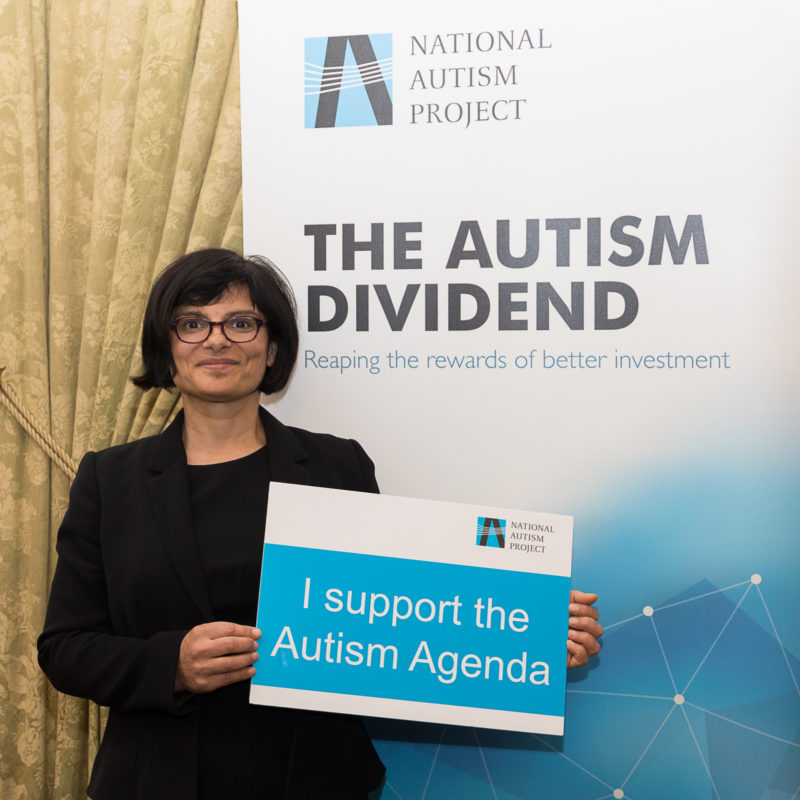Thangam Debbonaire
MP for Bristol West
Shadow Secretary of State for Culture, Media and Sport

Today is Autism Awareness Day. More than half a million people in the UK are on the autistic spectrum. This neurodiversity is a wonderful thing and should be celebrated. People who are not neurotypical bring enormous richness and unique perspectives which can benefit everyone. I celebrate Autism Awareness Day because I celebrate autistic people and people on the autistic spectrum.
In my first speech in Parliament, I promised that I would use my position as a Member of Parliament to fight to promote the needs of people on the autistic spectrum, and to work to make Bristol – and the country – autism friendly.
So on this Autism Awareness Day, I want to suggest a few ways that being autism friendly can help all of us.
Closing the Employment Gap
Research from the National Autistic Society in 2016 showed that 77% of unemployed autistic people want to be in work. Autistic people have a variety of exceptional skills that can enrich a workplace. And the range of careers and industries that autistic people want to work in is hugely diverse – from the arts, to scientific research, from medicine to law.
Yet a large proportion are unemployed. Only 32% of autistic people are in employment, compared to 47% of disabled people overall and 80% of non-disabled people.
We must close this gap.
I convened a roundtable for major employers in Bristol, including Bristol City Council, Rolls Royce, Airbus, Lloyds Banking Group and Avon Fire and Rescue. We discussed what support these companies offer their autistic staff and we heard a lot of good ideas about how we can all make workplaces in Bristol more autism friendly.
But the government should also play their part. I am the vice-chair of the All Party-Parliamentary Group on Autism, which is launching a commission on autism and employment. Last week I also raised this in Parliament, when I called on the government to do more to support employers to take on autistic employees, and to offer more training to Job Centre staff to help autistic people find fulfilling and rewarding work.
Opening up our Public Spaces
Life in Bristol is enriched by having amazing places of culture, learning and beauty to visit. Museums, concert venues, our zoo and heritage destinations like the SS Great Britain and Bristol Cathedral are all amazing places to spend time and enjoy.
Yet not all autistic people are able to enjoy public spaces. 50% of autistic people and families have said they sometimes don’t go out because they are worried about how people will react to their autism. Shockingly, 28% of autistic people have been asked to leave a public space because of behaviour associated with their autism.
There are lots of things we can all do to make public spaces more accessible for autistic people, but which will also benefit all of us. We all know that places like shopping centres or busy venues can be crowded, and that noisy spaces can be bewildering. This feeling can be even more intense for autistic people, who might experience sensory overload and need somewhere quiet and peaceful to recover.
Recently, I raised in Parliament the importance of accessible public spaces for autistic people. We would all benefit if public places are proactive in providing information about what visitors can expect, if they build in quiet spaces into their attractions, and if their staff and volunteers are trained in how autism might present in behaviour and responses to unfamiliar situations.
If you run a business or an attraction in Bristol and you’d like advice on how to be more accessible to autistic people, the National Autistic Society run an Autism Friendly award scheme where businesses can get advice on adjustments they can make to help autistic people access their services.
Hearing Autistic People’s Voices
In 2017, I was the first MP in the country to hold a constituency surgery specifically for autistic people and their families. I met a number of people who were keen to tell me about barriers they encountered in getting support in education, finding the right housing, or being able to access benefits and employment support. But they also told me about their interests and the opportunities they wanted.
Holding events like this allows politicians to make policy suggestions that will make a real and tangible difference to autistic people’s lives. But we can – and should do more.
Parliament itself can do much more to support autistic visitors, employees and politicians! I have repeatedly urged Parliament to use the upcoming renovation project as an opportunity to make Parliament more autism-friendly. It would be fantastic to change the noisy and cramped atmosphere of the Commons chamber. Not only would that help encourage autistic people to stand for parliament themselves, but it would also help all of us to debate and scrutinise legislation in a calmer and less frenetic environment.
Autism is complex, and no two individual’s experience will be the same. That’s why it is so important that we listen to autistic people’s experiences, and make sure that changes we make respond to autistic people’s real needs. The world is a richer and more interesting place, when autistic people are given true equality and are all able to flourish.
